Meet the individuals that make up our VOX-Pol network, and find out more about their work and research using the links below.
Leadership Team
Members
| J.M. Berger | Ala Berzinji | Lewys Brace | Steven M. Chermak |
| Adam Cook | Simon Copeland | Garth Davies | Angharad Devereux |
| Kareem El Damanhoury | James Fitzgerald | Richard Frank | Ninian Frenguelli |
| Iginio Gagliardone | Paul Gill | Thomas J. Holt | Muhammad Iqbal |
| Lee Jarvis | Lisa Kaati | Ashton Kingdon | Acram A. Latiph |
| Nuria Lorenzo-Dus | Ashley A. Mattheis | Weeda Mehran | Lella Nouri |
| Samuel Olaniran | Arie Perliger | Mario Peucker | Jonathan Pieslak |
| Matti Pohjonen | Alastair Reed | Connor Rees | Lori Regattieri |
| Diana Rieger | Mark Robinson | Anuradha Sajjanhar | Débora Salles |
| Rose Marie Santini | Ursula Kristin Schmid | Heidi Schulze | Debra Smith |
| Ramón Spaaij | Keith Spiller | Jack Springett-Gilling | Vít Střítecký |
| Sam Treacy | Gina Vale | Katy Vaughan | Michael S. Waltman |
| Shahed Warreth | Joe Whittaker | Kamil Yilmaz |
Stephane Baele is Associate Professor in Security and Political Violence at the University of Exeter. His multi-methods research on extremist and violent political actors’ communications and international security has appeared in more than twenty different scientific journals across the social sciences.

John Battersby is the NZ Police Teaching Fellow at the Centre for Defence and Security Studies (CDSS), Massey University, Wellington, lecturing in Crime, Intelligence and Terrorism. John was a Research Historian with the Treaty Issues and International Law Team at the Crown Law Office, Wellington, followed by a number of years in law enforcement. He was the inaugural Police Research Fellow at the Centre for Strategic Studies, Victoria University of Wellington in 2016 and has since become a Teaching Fellow at CDSS specialising in intelligence and counter terrorism. He contributes to professional development programmes with a number of different agencies. He has published on aspects of the New Zealand Wars, New Zealand security in the twentieth century and more recently terrorism. John is a frequent commentator in New Zealand and overseas media on intelligence, terrorism and gun control issues.
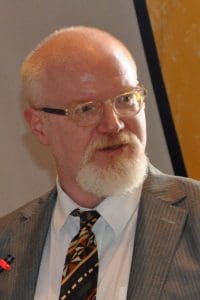
J.M. Berger is a consultant and author working on a suite of related issues that include extremism, misinformation, propaganda, advanced social media analysis, and technology sector content policies. A research fellow with VOX-Pol and a postgraduate research student at Swansea University’s School of Law, where he studies extremist ideologies, he is the author of four books: Optimal (2020), Extremism (2018), ISIS: The State of Terror (2015) and Jihad Joe: Americans Who Go to War in the Name of Islam (2011).

Ala Berzinji is a PhD student at the Department of Computer and System Science (DSV), Stockholm University, in the field of cyber security. She teaches cyber security to students at the Department of Computer Science at the University of Sulaimani. She obtained a Master’s degree in Computer Science from Uppsala University (2011). Her principal areas of interest include online extremism focusing on propaganda and cyber-terrorism. Mrs. Berzinji was the first female academic expert in cyber security in the Kurdistan region of Iraq. She is one of the few female experts in the technical aspect of cyber security in the area.
Lewys Brace is a Lecturer in Computational Social Science and part of the University of Exeter’s Q-Step Centre, where he specialises in data science/computational research methods, extremism, terrorism, cybercrime, and Open-Source Intelligence (OSINT). He is a Turing Fellow at the Alan Turing Institute and the lead for the Institute for Data Science and Artificial Intelligence’s Security and Policing theme . His recent research has explored the online behaviours of the far-right through the MineChans and ExID projects and more recently the incels trough the Con.Cel project. His work has appeared in journals such as Terrorism and Political Violence, Behavioral Sciences of Terrorism and Political Aggression, Studies in Conflict & Terrorism, and Perspectives on Terrorism. He can be found on Twitter with the handle @Lew_Brace.

Steven M. Chermak is a Professor in the School of Criminal Justice at Michigan State University, and an investigator for the National Counterterrorism Innovation, Technology, and Education (NCITE) Center and the Center for Accelerating Operational Efficiency (CAOE). He is also a Creator and co-Director of the U.S. Extremist Crime Database (ECDB), The American School Shooting Study (TASSS), and the U.S. Extremist Cyber Crime Database (ECCD). Recent publications have appeared in Terrorism and Political Violence, Criminology & Public Policy, and Justice Quarterly.
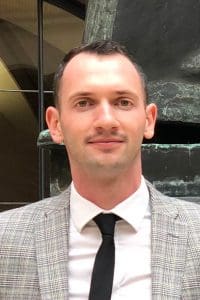
Jonathan Collins is a PhD candidate at the Department of Security Studies at Charles University, concentrating on the rise of the Far-Right as both a social movement and threat for violent mobilisation. Specifically, he aims to connect the current political, social, and economic grievances arising from the ongoing pandemic with the discursive recruitment and dissemination practices of the Far-Right. His other areas of interest include more broadly radicalisation, terrorism, conspiracies, and online extremism.
Cori E. Dauber (@coridauber) is Professor of Communication at the University of North Carolina at Chapel Hill, where she is also a Research Fellow at the Triangle Institute for Security Studies (TISS.) She is co-editor of Visual Propaganda and Extremism in the Online Environment, (US Army War College Press, 2014) and the author of You Tube War: Fighting in a World of Cameras in Every Cell Phone, Photoshop on Every Computer (US Army War College Press, 2010.) She has been the Visiting Research Professor at the Strategic Studies Institute of the US Army War College. Her research focus is the communication strategies of terrorist groups, with a particular focus on their use of visual imagery. Her work has been published in journals such as Military Review, Armed Forces and Society, Jihadology.net and Rhetoric and Public Affairs, and she has presented her research to the Council on Foreign Relations, the John Kennedy School for Special Warfare, the Foreign Policy Research Institute, and the Near East South Asia Center for Strategic Studies of the National Defense University among others. Dr. Dauber holds a PhD and BS from Northwestern University, and an MA from Chapel Hill, all in Communication Studies.
Garth Davies is an Associate Professor in the School of Criminology at Simon Fraser University and is the Associate Director of the Institute on Violence, Extremism and Terrorism at Simon Fraser University. Because Dr. Davies has a short attention span, his current work involves research on: risk assessment for violent radicalization, the social psychology of radicalization; the statistical modeling and projection of violent right-wing extremism; misogynist terrorism; understanding conspiracy theories as extremist narratives; and the evolution of left-wing terrorism. He has also been involved in the continued development of the Terrorism and Extremism Network Extractor (TENE), a web-crawler designed to investigate activities on the internet. The crawler is presently being used to examine violent extremism on the dark net. Dr. Davies has presented at dozens of national and international conferences, including the Western Society of Criminology, the Academy of Criminal Justice Sciences, and the American Society of Criminology. He has also presented at briefings for the Integrated National Security Enforcement Team (“E” Division), the Canadian Security Intelligence Services, and Public Safety Canada, and has testified on national security issues in front of both the Canadian Parliament, as well as the Standing Senate Committee on National Security and Defense.

Julian Droogan is an Associate Professor of Terrorism Studies at the Department of Security Studies and Criminology, Macquarie University where he is the Editor-in-Chief of the Journal of Policing, Intelligence and Counter Terrorism (Routledge). Julian’s academic background encompasses the anthropology and history of religions. His research interests include violent extremism online, religious radicalisation, extremist narratives, and applied countering violent extremism. Julian leads a number of funded research projects including the evaluation of countering violent extremism (CVE) programs in Australia, an ongoing partnership with the New South Wales (NSW) government looking at ways to install and evaluate counter terrorism and social resilience projects in NSW communities, and an Australian Research Council (ARC) Discovery grant project examining the relationship between online extremist materials and real-world violent extremist action.
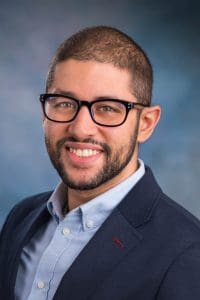
Kareem El Damanhoury (Ph.D. Georgia State University) is an Assistant Professor of Media and Journalism Studies and faculty affiliate in the Center of Middle East Studies at the University of Denver. His research focuses on visual communication, media and conflict, and international/intercultural communication. Much of his work in recent years has centered on the use of new media and visual communication strategies by violent militant groups, including ISIS and al-Qaeda, and nation states as well as on the emergence of alternative proto-state media systems. His recent co-authored book, Proto-state Media Systems: The Digital Rise of al-Qaeda and ISIS (co-authored by Carol Winkler; Oxford University Press, 2022), introduces new theoretical and methodological approaches to understanding how militant groups operate online. His work has also appeared in numerous journals, such as Terrorism and Political Violence, International Journal of Communication, Media, War & Conflict, Dynamics of Asymmetric Conflict, Journal for Deradicalization, Journalism Practice, Digital Journalism, Journal of Middle East Media, Behavioral Science of Terrorism and Political Aggression, Journal of Media & Religion, Journal of Global Security Studies, Journal of Place Branding and Public Diplomacy, and Arab Media & Society, etc. His forthcoming book, Photographic Warfare: ISIS, Egypt and the Online Battle for Sinai (University of Georgia Press), dissects the visual contestation phenomenon between militant groups and nations states, using Egypt as a case study.

James Fitzgerald is Assistant Professor in Security Studies at the School of Law and Government, Dublin City University, and Founding Director of the Erasmus Mundus International Master in Intelligence and Strategic Studies (IMSISS): DCU’s first Erasmus Mundus Joint Master Degree. Previously co-convenor of the BISA Critical Studies on Terrorism Working Group (2013-2017), he specialises in applying political theory to dynamics of terrorism and political violence (and vice-versa). He is variously published in top-ranking journals, including Critical Studies on Terrorism and First Monday and his current research focuses on ontologies of security, intersections of conspiracy with political violence and ‘radicalisation’ and the discursive construction of displaced individuals as ‘potential terrorists’.

Richard Frank is Associate Professor in the School of Criminology at Simon Fraser University (SFU), Canada and Director of the International CyberCrime Research Centre (ICCRC). Richard completed a PhD in Computing Science (2010) and another PhD in Criminology (2013) at SFU. His main research interest is Cybercrime. Specifically, he’s interested in researching hackers and security issues, the dark web, online terrorism and warfare, eLaundering and cryptocurrencies, and online child exploitation. He is the creator of The Dark Crawler, a tool for collecting and analyzing data from the open Internet, dark web, and online discussion forums. Through this tool the ICCRC has collected ~150 million posts from various right-wing, left-wing, gender-based and religiously-motivated extremist communities, leading to a number of projects and publications. Richard has publications in top-level data mining outlets, such as in Knowledge Discovery in Databases, and security conferences such as Intelligence and Security Informatics (ISI). His research can also be found in Criminology and Criminal Justice, Journal of Research in Crime and Delinquency, and the Canadian Journal of Criminology and Criminal Justice, to name a few.

Iginio Gagliardone is Associate Professor in Media and Communication at the University of the Witwatersrand, South Africa, and Associate Research Fellow in New Media and Human Rights in the Programme in Comparative Media Law and Policy (PCMLP), University of Oxford. His work explores the relationship between new media, political expression, and human development, and the emergence of distinctive models of the information society in the Global South. He is the author of China, Africa, and the Future of the Internet (ZED), The Politics of Technology in Africa (Cambridge University Press), and World Trends in Freedom of Expression and Media Development (UNESCO). His study Countering Online Hate Speech, supported by UNESCO, has rapidly become one of the most cited publications in the field, highlighting the need to develop bottom-up and contextually informed responses to the emergence of online hatred.

Paul Gill is a Professor of Security and Crime Science at University College London. He has over 80 publications on the topic of terrorist behaviour. He currently manages European Research Council Starter Grant project entitled GRIEVANCE. Collectively these grants have been worth over 9 million euro. These projects focused upon various aspects of terrorist behavior including the IED development, creativity, terrorist network structures, risk assessment and management, and lone-actor terrorism. He has published in leading psychology, criminology and political science journals.

Thomas J. Holt is a Professor in the School of Criminal Justice at Michigan State University. His research focuses on cybercrime, cyberterrorism, and online deviance. His work has appeared in various outlets, including Criminal Justice & Behavior, Crime & Delinquency, and Social Science Computer Review.
Dr Muhammad Iqbal is a Research Fellow at the Institute for Sustainable Industries and Liveable Cities (ISILC) at Victoria University, Melbourne, Australia. He is also a Chief Investigator in the Applied Security Science Partnership (ASSP), which brings together policing and security practitioners with academics to collaboratively build robust evidence on behavioural indicators of violent extremism.
Lee Jarvis is Professor of International Politics at the University of East Anglia, UK. His research focuses on how security threats such as terrorism are constructed and communicated, and the implications of this for citizenship, communities, and policy. He has published fourteen books, five special issues, and over fifty articles/chapters on his own or in collaboration with others. His articles have appeared in journals including Political Studies, Review of International Studies, International Political Sociology, Security Dialogue, and Terrorism and Political Violence. His books include research monographs with Manchester University Press and Palgrave, and the award-winning Terrorism: A Critical Introduction (Choice Outstanding Academic Title award, 2012). His research has been funded by various external organisations including the Economic and Social Sciences Research Council, the Arts and Humanities Research Council, the Australian Research Council, NATO, and the U.S. Office for Naval Research. He co-edits the academic journal Critical Studies on Terrorism.

Lisa Kaati achieved a PhD in computer science from Uppsala University in 2008. Her principal research interests are in the area of terrorism and the Internet, and in particular how computer science, psychology, and statistics can be used to study different behaviors. She is the author of over 50 academic articles, book chapters, and several reports. Dr. Kaati has presented her findings before the Swedish Government, The Finish Government, The Commission of the European Union, and elsewhere. She is a member of the Academic Advisory Board of Europol’s Counter-terrorism Center and the Radicalisation Awareness Network (RAN) Advisory Board of Researchers. She is an associate editor of the journal Social Network Analysis and Mining. Between 2008-2022 Dr. Kaati was working at the Swedish Defence Research Agency (FOI) where she was the head of the interdisciplinary Data science group. For 6 years, Dr. Kaati was working on a commission from the Swedish Government to study violent extremist propaganda online.

Ashton Kingdon is a Lecturer in Criminology at the University of Southampton. She is also an Advisory Board Member at the Accelerationism Research Consortium and a core member of the Extremism and Gaming Research Network (EGRN). Her research is interdisciplinary, combining criminology, history, and computer science to explore the ways in which extremists utilise technology for recruitment and radicalisation, whilst giving equal weight to the subcultural elements of the users of this technology. In addition, she examines the various ways history is being manipulated and weaponised to fuel contemporary extremist narratives. She has taught widely in the areas of criminology, security theory, politics and international relations, and terrorism studies. Throughout the past few years she has advised the UK and US governments, military, United Nations, the police, and social media companies as to the risks posed by extremists operating online. In addition to extremists’ use of technology to recruit and radicalise, her expertise lies in analysing the relationship existing between terrorism and climate change.
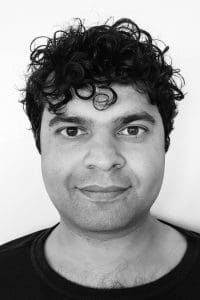
Suraj Lakhani is a Senior Lecturer in the Department of Sociology at the University of Sussex. He also holds the roles of Research Fellow at VoxPol, Associate Fellow at the Royal United Services Institute, and Core Member of the Extremism and Gaming Research Network. His research interests include the sociology of terrorism, (violent) extremism and the internet, radicalisation, violent extremism and video-gaming, and counter-terrorism policy. He has published a number of peer reviewed journal articles in internationally recognised academic publications, including Critical Studies on Terrorism, Studies in Conflict & Terrorism, Terrorism and Political Violence, and The Howard Journal of Criminal Justice, amongst others. He also has a number of book chapters in edited collections. Suraj has acted as primary investigator, both individually and leading recognised international consortiums consisting of a number of renowned world-leading experts on terrorism, on research projects funded by, for example, the Home Office, European Commission, Research England, ESRC, British Academy, and the Leverhulme Trust.

Acram A. Latiph is the Executive Director of the Institute for Peace and Development in Mindanao and a Professor of the Department of Economics, Mindanao State University – Marawi Campus. He completed his Bachelor of Science in Economics from San Beda College, Master of Science in Finance from the University of the Philippines, Diliman, Advance Certificate in Conflict Resolution from the Program for the Advancement of Research on Conflict Executive Master Public Policy from the Maxwell School of Citizenship, Syracuse University, New York, and his PhD in Development Economics from the Australian National University. He is a recipient of the Fulbright Scholarship, the Australian Leadership Award Scholarship and the NISGP Scholarship. His research interests are peace and conflict studies, preventing and countering violent extremism, political economy, policy analysis, regional planning, and sustainable development, Islamic finance and banking, and Bangsamoro and Muslim issues in the Philippines.

Anthony F. Lemieux is Founding co-Director of the Atlanta Global Studies Center and Professor of Communication at Georgia State University, and was previously an American Council on Education Fellow. He is a faculty member in the Transcultural Conflict and Violence Initiative. In his administrative and leadership roles, Lemieux has prioritized support for collaborative, interdisciplinary research and curricular efforts that address issues of pressing global significance, and student engagement and success. Lemieux is Principal Investigator of the U.S. Department of Defense Minerva Initiative supported interdisciplinary, multi-institution, research program on Mobilizing Media which leverages empirically-validated models of health behavior change, persuasion, and communication to provide comprehensive analysis of strategic communication campaigns and propaganda outputs of terrorist groups including magazines, music, images, texts, and videos. In addition, he is co-PI on a U.S. Department of Education supported National Resource Center and FLAS program in collaboration with colleagues at Georgia Tech. He was previously Principal Investigator of a Department of Homeland Security funded program on Using Experimental Research to Study the Dynamics of Radicalization and Terrorism. Lemieux has regularly been featured in National and International media. He earned his Ph.D. and M.A. in social psychology at the University of Connecticut and his B.A. in psychology and sociology at Boston College.

Ayse D. Lokmanoglu is a Post-Doctoral Fellow at the Center for Communication & Public Policy at Northwestern University. Her work focuses on malign digital campaigns (hate speech, extremism, disinformation) and utilizes computational methodologies to examine harmful narratives and digital messaging. She has published in journals including Studies in Conflict and Terrorism, Cambridge Review of International Affairs, International Journal of Communication, Health Communication, Social Science and Medicine, and many others.

Stuart Macdonald is Professor of Law at Swansea University, UK. Stuart is Director of the University’s Cyber Threats Research Centre (CYTREC) and a Co-Director of its £7.5m EPSRC Centre for Doctoral Training in Enhancing Human Interactions and Collaborations with Data and Intelligence Driven Systems. Stuart is also the lead organiser of the biennial #TASMConf (Terrorism and Social Media Conference) and co-ordinates the University’s contribution to the Global Network on Extremism and Technology (GNET). Stuart’s research interests lie in criminal law and counterterrorism, particularly cyberterrorism and terrorists’ use of the internet. His most recent work has examined violent jihadist narratives, their dissemination via online platforms, and legal and policy responses. Stuart has held visiting scholarships in the US, Australia and France and in 2016/17 was the holder of a Fulbright Cyber Security Award.

Ashley A. Mattheis holds a Ph.D. in Communication from the University of North Carolina at Chapel Hill. Her work brings together cultural studies, media studies, and rhetorical criticism, through the lens of feminist theory to explore the material effects of cultural production and consumption online. Her areas of inquiry include topics such as masculinities and online misogyny in the Manosphere, the linkages between the Manosphere and the Far/Alt-Right, and Alt-Right women’s discourses about negotiating submission and action in extremist groups, and the visual rhetoric of Far-Right extremist propaganda. Her publications include: Atomwaffen Division and its Affiliates: Variations, Interconnections, and Practices, a report published by the Resolve Network, “#TradCulture: Reproducing Whiteness and Neofascism through Gendered Discourse Online,” in the forthcoming Routledge Handbook of Critical Studies in Whiteness,” “Does the Institution have a Plan for That?: Researcher Safety and the Ethics of Institutional Responsibility,” in Researching Cybercrimes: Methodologies, Ethics, and Critical Approaches, “Shieldmaidens of Whiteness: (Alt)Maternalism and Women Recruiting for the Far/Alt-Right,” in the Journal for Deradicalization, and ‘The Greatness of Her Position’: Comparing Identitarian and Jihadi Discourses on Women, a report published by the International Centre for the Study of Radicalization.

Weeda Mehran, PhD (Cambridge), MSc (Oxford) is a faculty member at the Department of Politics & Co-director of the Centre for Advanced International Studies (CAIS) at the University of Exeter. Dr Mehran has formerly worked at the Global Studies Institute, Georgia State University, McGill University and Dublin City University (as aVox-POL visiting scholar). She has worked with several national and international organisations. She has been an advisor to the UK House of Lords’ Inquiry on Afghanistan and has consulted for the UNWOMEN, NATO, UNDP and a number of NGOs based in Afghanistan. Her research has been published in journals such as Studies in Conflict and Terrorism, Small Wars and Insurgencies, Behavioural Science of Terrorism and Political Violence, Central Asian Survey and Journal of Peacebuilding and Development. She has also published opinion pieces in news outlets such as The Conversation, The Guardian and The Telegraph. Weeda provides TV and radio commentaries for news organisations such as BBC, CNN, Sky News, France24, CTV, Financial Times as well as commentaries for other news outlets.

Brigitte Naderer is a Post-Doctoral researcher at the Department of Media and Communication, LMU Munich. Her research focuses on media effects, media literacy and persuasion processes. Her recent work includes research on 1) Online radicalization processes and 2) evaluation of media literacy interventions (which is part of the EU funded project PRECOBIAS), as well as 3) work on preventing terrorist actors from disseminating terrorist content (part of the EU-funded project TATE). Her methodological expertise focuses on quantitative content analysis and experimental designs.
Nick Nelson has extensive experience in both the security sector and academia, and is currently a Senior Lecturer at Massey University’s Centre for Defence and Security Studies. He teaches in a diverse range of subject areas including terrorism, cyber security, and the psychology of security. His main research interest is in how the online environment impacts issues of national security.
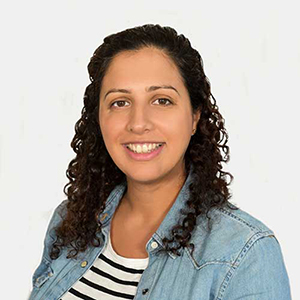
Dr Lella Nouri is a Senior Lecturer of Criminology and Programme Director of the MA in Cyber Crime and Terrorism at Swansea University. She specialises in extremism, terrorist use of the internet and in particular extreme right ideologies. Her most recent work on extremist use of the internet has examined far and extreme right narratives, their dissemination via social media and provided recommendations for policy and community responses. Alongside this work, Lella has been actively working with councils across Wales to combat hate visuals across communities. Prior to this, her work has focused on extreme right propaganda dissemination online, constructions of cyberterrorism, examining definitional issues, and governmental responses to terrorism. As well as co-organising numerous events on these topics, including a VOX-Pol extreme right workshop, Lella has published a variety of edited collections, journal articles, book chapters, research reports and blogs through leading publishers in the field. Stakeholder and community impact and engagement work is at the heart of Lella’s research. At current she is a member of the Academic-Practitioner Counter Extremism Network (APCEN) for the Commission for Counter Extremism (UK Home Office), Member of the Accelerated Capability Environment (ACE) Research Network, Homeland Security Group at the UK Home Office as well as the UK Counter-Terrorism Policing Evidence-Based Review Group.
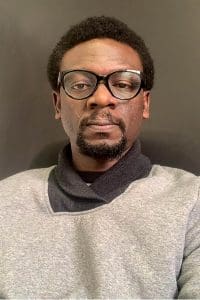
Samuel Olaniran’s research focuses on digital mis/disinformation and on the different forms of interpreting the appropriation of technology in different contexts. He is interested in how audiences in the Global South interact with global phenomena in unique ways that are distant from global framings. He is also interested in identifying coordinated inauthentic behaviour on social media using open source intelligence tools. He is completing his PhD in Media Studies at the University of the Witwatersrand, South Africa.

Elizabeth Pearson is a Lecturer in Criminology at Royal Holloway, University of London, where she is affiliated with the Gender Institute and the Conflict, Violence and Terrorism Research Centre. Elizabeth specialises in gender, extremism and countering extremism and has written about and researched extremism in both online and offline spaces. Her book on extremism and masculinities in the UK is forthcoming, and she is author of Countering Violent Extremism: Making Gender Matter, with Emily Winterbotham and Dr Katherine Brown. The book is based on research with the Royal United Services Institute (RUSI) where Elizabeth is an Associate Fellow. She is also an Associate Fellow with the International Centre for Counter-terrorism (ICCT). Before academia Elizabeth spent more than fifteen years with BBC radio where she worked in production, reporting and feature-making, mainly for BBC Radio Four.

Arie Perliger is a Professor and the Director of the graduate program in Security Studies at the School of Criminology and Justice Studies, University of Massachusetts Lowell. In the past 20 years, he was engaged in an extensive study of issues related to terrorism and political violence, security policy and politics (including the nexus of security and climate change), politics and extremism of the Far Right in Israel, Europe, and the US, Middle Eastern Politics, and the applicability of Social Network Analysis to the study of political violence. His studies appeared in nine books and monographs and in numerous articles and book chapters and were cited in more than 1900 academic texts. His recent book, American Zealots – Inside Right-Wing Domestic Terrorism, which was published by Columbia University Press, provides an in-depth analysis of the history and contemporary trends of the violent American far-right. Dr. Perliger was also engaged in training practitioners from various agencies such as the FBI, CIA, and ICE. Additionally, he provided professional briefings to high-rank officials from the government and military, such as The Secretary of the Army, Army Chief of Staff, and SOCOM, AFRICOM, NORTHCOM, and JSOC commanders. Dr. Perliger is also engaged in informing the public via contributions to various media platforms. His articles/interviews appeared, among others, in the NY Times, BBC, CBS News, and Newsweek.
Mario Peucker is a Senior Research Fellow at the Institute for Sustainable Industries and Liveable Cities at Victoria University (Melbourne). He is also an executive member of the inter-national research think tank CRIS, the Centre for Resilient and Inclusive Societies, and a member of the Addressing Violent Extremism and Radicalisation to Terrorism (AVERT) Research Network, where he sits on the steering committee. Mario has undertaken qualitative and quantitative research on dissent and citizenship, hate crime and racism as well as radical political movements, in particular on the far-right fringes, since 2003, both in Europe and in Australia (since 2011). His current research focusses mainly on far-right mobilisation in online and offline spaces, the interplay between far-right and radical left movements, and the interconnectedness of far-right fringes and mainstream discourses. He is the co-editor of the first academic book on the contemporary far right in Australia (2019, Palgrave, co-edited with Debra Smith) and has published a number of journal articles, book chapters and research reports in the thematic area of radicalism and extremism.

Jonathan Pieslak is Professor at The City College of New York and Graduate Center, CUNY where he specializes in the cultural and media dimensions of extremism, particularly audio and music. He is the author of two books, Radicalism & Music (Wesleyan University Press 2015), and Sound Targets: American Soldiers and Music in the Iraq War (Indiana University Press 2009), and has published among many of the leading journals on terrorism and political violence. Jonathan’s research has been supported by a Guggenheim Fellowship and he was recently part of a six-year team project exploring the mobilizing influence of media in the contexts of terrorism, funded by a Minerva Grant from the U.S. Department of Defense. Also a composer, Jonathan is a fellowship winner from the American Academy of Arts and Letters for music composition, having worked with members of the New York Philharmonic, Orpheus Chamber Orchestra, Kiev Philharmonic, among others.

Matti Pohjonen is a media anthropologist who works as a Researcher at the Helsinki Institute for Social Sciences and Humanities (HSSH), at University of Helsinki, where he leads work on the development of digital methods for research. His research focuses on the intersection of digital anthropology, philosophy and data science. This has included, among other things, work on international news and blogging in India, mobile technology in East Africa, comparative research on online extremism and hate speech in Ethiopia and Europe, and exploring new methods in “big data” analysis and artificial intelligence for digital media research. He received his MA and PhD from the School of Oriental and African Studies (SOAS), University of London, where he also worked as a Lecturer in Global Digital Media (2018-2020), Senior Teaching Fellow (2006-2009) an AHRC-funded Post-Doctorate Research Fellow (2013). He was also previously a Researcher for the Programme for Comparative Media Law and Policy (PCLMP), at the University of Oxford (2013-2016), a Research Fellow (2015-2016) for the VOX-Pol Network of Excellence, and a Visiting Research Fellow (2017) at the Centre for Media and Communication (ZeMKI), at the University of Bremen.

Connor Rees is a PhD Candidate at Swansea University. His work covers the role of content moderation by social media platforms, in the context of extremist content removal (particularly the extreme right). Whilst his research looks at online extremism it expands to Human-Computer Interaction, Ethics, and regulation of Artificial Intelligence within the same remit. He also teaches a range of classes related to his research and has engaged in numerous interdisciplinary projects in both academia and practice, including the Developing Resistance Against Grooming Online – Spot and Shield (DRAGON-S) project.

Lori Regattieri is a PhD in Communication and Culture (2017-2021) at the Federal University of Rio de Janeiro (UFRJ), Rio de Janeiro, Brasil. Research assistant at Netlab/UFRJ, investigating fairness in artificial intelligence, algorithmic epistemologies and propaganda in the Global South. Digital strategist with more than 12 years of experience, focusing on strategies for civic engagement in climate justice, democracy and promoting LGTBQIs rights.

Diana Rieger has been a Full Professor at the Department of Media and Communication, LMU Munich, since September 2018. LMU Munich is the leading teaching & research university in Germany, ranking 1st in Germany in the latest Times Higher Education World University Ranking. The Department of Media & Communication (IfKW) is one of the largest and internationally most visible communication science departments, ranking 1st in Germany in the latest Shanghai Ranking. It is internationally recognized for its excellence in research in a broad variety of areas, specifically media & politics, digital communication and extremism. Rieger’s research focuses on extremism, entertainment communication, hate speech and radicalization from a communication and social science perspective. Her recent work includes: 1) Research on content and effects of extremist online messages; 2) Developing and testing counter narratives (against right-wing extremism and Islamism); and, 3) Research on online hate speech online. She has led in the past and is currently leading several national and international funded projects on the topics counter-radicalization (CONTRA, PRECOBIAS), understanding radicalization processes (MOTRA) and hate speech (KISTRA). She is Vice-Director of the Department of Media and Communication at LMU Munich and Vice Dean of the Faculty of the Social Sciences.

As Director of the Media Art Space in the UNC-CH Communication department, Mark Robinson’s extensive technical expertise, developed over 35+ years, encompasses the making and assessment of multi-media particularly those involving computer, Internet technologies, audio, standard and high definition video formats with a technical, artistic and cultural expertise. Robinson demonstrates proficiency in technology as tool to achieve and understand the complex interactions of media creation and consumption, in specific those of the propaganda of right-wing and jihadist violent extremists. In addition to forensic and technical analysis skills, his work engages with the high craft of audio and visual communication and the consumption and processing within cultural context, thus integrating cultural, technical and psychological system analysis in order to understand the harmonic relationship of meaning within the cultural affect. Interested in the intersections and networks of culture and technology, Robinson received a M.A. in Communications Studies from The University of North Carolina at Chapel Hill in 2001 where his thesis explored the relationships of Quantum (Mechanics) Identity with forms of subjectivity and cultural mediation found on the Internet. Robinson’s undergraduate background includes a B.F.A. in Studio Art, Multimedia and Video Sculpture, also from the University of North Carolina at Chapel Hill in 1991 and also includes substantial work in Aerospace Engineering at North Carolina State University (1983-1986).

Anuradha Sajjanhar is an Assistant Professor/Lecturer in Politics and Public Policy at the University of East Anglia, UK. She works at the intersection of comparative politics, communication, sociology, and public policy. She asks questions about ideology and discourse, processes of policy making, and right-wing mobilisation in the US, UK and India.

Débora Salles is a Postdoctoral Researcher at NetLab at the School of Communication of the Federal University of Rio de Janeiro (UFRJ), acting as a specialist in populist communication logics on social media. Her research focuses on digital media, computational propaganda, social networks and disinformation. She received a CAPES scholarship for her Master’s in Communication and Culture (2013-2015, UFRJ) and Doctorate (2016-2020, Information Science, UFRJ).

Rose Marie Santini is an Associate Professor at the School of Communication, Federal University of Rio de Janeiro (UFRJ), Brazil. She is an Associate Researcher and Member of the Academic Information Science Graduate Program, founding member and director of NetLab – Laboratory for Internet and Social Media Research at UFRJ. She is a Brazilian National Council for Scientific and Technological Development CNPq Fellow.

Ursula Kristin Schmid is a Doctoral researcher at the Department of Media and Communication, LMU Munich. Her research focuses on digital media effects, specifically on the perception of hate speech and online incivility as well as counter speech. She currently works in a German large-scale research project on online hate speech (KISTRA) that conducts interdisciplinary research on the opportunities and framework conditions for the ethically and legally justifiable use of artificial intelligence systems by investigating authorities for detection, prevention, and prosecution of criminal offenses online. In her PhD thesis, she examines online users’ perception and processing of the combination of humor and hate speech, e.g. within online memes.

Heidi Schulze is a Doctoral researcher at the Department of Media and Communication, LMU Munich. She currently works in a large-scale research project on (online) radicalization dynamics (MOTRA), that aims at improving our understanding of the complex mechanism and dimensions of (online-)radicalization processes by employing multimethodological, computational approaches. In her PhD thesis, she studies hyper partisan news websites in their function as normalizers of extremist speech and attitudes, aiming at a better understanding of how this novel news media kind contributes to radicalization dynamics.

Ryan Scrivens is an Assistant Professor in the School of Criminal Justice at Michigan State University. He is also an Associate Director at the International CyberCrime Research Centre at Simon Fraser University and a Research Fellow at the VOX-Pol Network of Excellence. He conducts problem-oriented interdisciplinary research with a focus on terrorists’ and extremists’ use of the Internet, right-wing terrorism and extremism, and hate crime. His research has been funded by Public Safety Canada, the Canadian Network for Research on Terrorism, Security and Society, and VOX-Pol. His recent work appears in Terrorism and Political Violence, Studies in Conflict & Terrorism, and New Media & Society.

Debra Smith is a Research Professor at Victoria University. She co-leads the Applied Security Science Partnership (ASSP), comprising academics, Victoria Police, Defence Science Technology (DST), and community groups, working collaboratively to enhance understanding of terrorism and violent extremism. Her research program focuses on behavioural indicators associated with mobilising to violence, the contemporary extreme right in Australia, and effective early intervention and rehabilitation strategies for people engaged in violent extremism. She has a particular focus on translating research for frontline practitioner use and provides training to state and federal policing agencies, government departments, and other frontline workers on Australia’s countering violent extremism early intervention and case management program. Debra was awarded her Ph.D. in Political Science from Monash University for her exploration of the role of emotion within decisions to engage in violent political extremism. She also holds a B.A. (1st class Honours) from the School of Social and Political Inquiry at Monash University. Debra was awarded the Vice Chancellor’s Award (2019) for Excellence in Engagement and the Vice Chancellor’s Award (2020) for Excellence in Research. She was appointed by the Victorian State Government to the expert panel for the Independent Review of Effective Case Management and Information Sharing Barriers relevant to Violent Extremism. She co-edited Australia’s first book on the Far- Right in Contemporary Australia (with Dr Mario Peucker), and is currently co-authoring the book, International Terrorism and Counter-Terrorism in the Australian Context for Palgrave MacMillan (with Dr Andrew Zammit).

Professor Ramón Spaaij is a sociologist based at Victoria University in Melbourne, Australia, and the Utrecht University School of Governance, the Netherlands. Dr Spaaij is a globally recognised expert on terrorists acting alone or in small groups. He is the author of The Age of Lone Wolf Terrorism (Columbia University Press, 2017, with Mark S. Hamm) and Understanding Lone Wolf Terrorism: Global Patterns, Motivation and Prevention (Springer, 2012). Dr Spaaij has an extensive record of research partnerships with government and industry. He contributes regularly as an academic expert, speaker, and educator to the United Nations, Radicalisation Awareness Network (RAN), national governments, police forces, and community organisations. Dr Spaaij co-leads the Applied Security Science Partnership (ASSP), comprising academics, Victoria Police, Defence Science Technology (DST), and community groups, working collaboratively to enhance understanding of terrorism and violent extremism.

Dr Keith Spiller is Lecturer in Criminology at University of Southampton and his research focuses on the social consequences of surveillance and monitoring. He has a particular interest in the tacit knowledges employed by organisations and individuals when performing security roles. Recent work has reviewed the impacts of UK Counter Terrorism and Security Act (2019), the Prevent Duty and UK Universities. He is currently interested in self-mobilized ‘citzen’ groups who perform localised security functions. Keith has published work on the Prevent Duty, eBorders, money laundering, CCTV, lifelogging, watch groups, social media and the impacts of security regimes. He is also Associate Editor of the journal Surveillance and Society.

Vít Střítecký is Associate Professor of Security Studies and Head of the Department of Security Studies at Charles University, Prague. He is also Founding Director of the Erasmus Mundus International Master in Intelligence and Strategic Studies (IMSISS). In his research he focuses on the interplay between security and technology, currently with an interdisciplinary focus on security and safety of machine learning. He is Founding Member of Periculum, Charles University Centre of Excellence, where he contributes to the program on Machine Learning/Artificial Intelligence (AI/ML). His has recently co-edited a volume on political revisionism (Routledge) and his publications have appeared in top ranking journals, including ACM Computing Surveys, European Security, and Futures. Besides his academic activities he previously advised the MFA, European Parliament, and the Defence and Security Industry Association of the Czech Republic.

Gina Vale is a Lecturer of Criminology in the Department of Sociology, Social Policy, and Criminology at the University of Southampton. She is also an Associate Fellow of the International Centre for Counter-Terrorism (ICCT). Gina’s research takes a feminist, intersectional approach to studying terrorism and extremist violence. She primarily focuses on terrorist governance, genocide, extremist propaganda, and the organisational roles and experiences of women and children. Gina has academic and professional experience in Europe, the Middle East, and Sub-Saharan Africa, and has conducted extensive fieldwork in internally displaced persons camps in Northern Iraq and Iraqi Kurdistan. Her work has been published by Studies in Conflict & Terrorism, Critical Studies on Terrorism, Small Wars & Insurgencies, Conflict, Security & Development, the Journal of Human Trafficking, Enslavement, and Conflict-Related Sexual Violence, and the CTC Sentinel, among others.

Lise Waldek is a Senior Lecturer at the Department of Security Studies and Criminology, Macquarie University. Lise’s research draws from her applied professional and academic experiences in security studies. Prior to moving into academia she worked for the UK Ministry of Defence. Her research interests include countering violent extremism, online violent extremism, behavioural science and its application to terrorism and cyber security, and processes of radicalisation to violent extremism. Her research focuses on developing multi-disciplinary approaches and solutions to complex societal problems. Lise leads a number of funded research projects. These have included the evaluation and design of countering violent extremism (CVE) programs in Australia; partnerships with New South Wales (NSW) government to understand online violent extremism and resilience to online violent extremism; an Australian Research Council (ARC) Discovery Project Grant examining youth experiences of online violent extremism in Australia.
Michael S. Waltman is an Associate Professor of Communication at the University of North Carolina at Chapel Hill, where he is also a Mosier Fellow in the Institute for the Arts and Humanities, and a Fellow with the Faculty Engaged Scholars Program of the Carolina Center for Public Service. He earned his Ph.D. from Purdue University, his M.A. from the University of Kentucky and his B.S.E. from the University of Arkansas. Dr. Waltman’s research addresses the role that hate speech plays in the service of a variety of social and persuasive goals. Specifically, his work addresses the role of hate speech in the radicalization and recruitment of individuals into hate groups (e.g., Neo-Nazis, racist Neo-Pagans, and Christian Identity adherents) and the grooming of individuals to commit hate crimes and acts of ethno-violence. His work also addresses the role of hate speech in politician’s and media pundit’s attempts to advance their ideological agendas, win political victories, and consolidate power. Dr. Waltman’s current interests deal with how White Nationalist and jihadist efforts converge in their discourse. This has significant policy implications for how the groups should be treated by law enforcement and legislators responsible for developing policy and budgets to address the threat they pose to public safety. He is the author of several books including Hate on the Right: Right Wing Political Groups and Hate Speech (New York: Peter Lang Publishers), Teaching Hate: The Role of Visual Imagery in the Radicalization of White Ethno-Terrorists in the United States and The Communication of Hate (New York: Peter Lang Publishers) (with John Haas). His work has also appeared in Visual Propaganda and Extremism in the Online Environment (Carol K. Winkler and Cori E. Dauber Eds.) as well as in Understanding Hate Speech: The Oxford Research Encyclopedia of Communication (with Ashley Mattheis.)

Shahed Warreth is a PhD candidate at Swansea University. Her research looks at applying digital forensics and machine learning to the automatic detection of modified terrorist propaganda. She also works in the trust and safety field. Shahed has an International Master’s in Security, Intelligence and Strategic Studies (IMSISS), awarded by the University of Glasgow, Dublin City University, and Charles University in Prague. Her previous research includes extremists’ use of crowdfunding, cryptocurrencies, and blockchain technology.
Amy-Louise Watkin is a Lecturer in Criminal Justice at the University of the West of Scotland. Amy-Louise’s research interests include online terrorist and violent extremist content, and the regulation of this online content. Amy-Louise undertook her PhD at Swansea University as a member of CYTREC. Amy-Louise has been a member of the Building Resilience Against Violent Extremism (BRaVE) project and the GIFCT Legal Frameworks Working Group.

Joe Whittaker is a lecturer in Cyber Threats at Swansea University. His primary research interest is online radicalisation. For his doctoral research he created a database of 231 Islamic State terrorists that operated within the United States. He also researches how recommendation algorithms promote extremist content, as well as counter-narratives. He is also interested in ethics and researcher welfare.

Carol Winkler (Ph.D. University of Maryland) is a Professor of Communication Studies and lead faculty member of the Transcultural Conflict and Violence initiative at Georgia State University. Her research interests include terrorism, visual communication, networked argumentation, and presidential rhetoric. Over the past seven years, she has examined the media strategies of extremist groups in the MENA region. Her work in that area has culminated in her most recent book, Proto-state Media Systems: The Digital Rise of al-Qaeda and ISIS (co-authored by Kareem El Damanhoury; Oxford University Press, 2022) and numerous articles in journals such as Terrorism and Political Violence, Media, War & Conflict, Cambridge Journal of International Affairs, International Journal of Communication, Dynamics of Asymmetric Conflict, Behavioral Science of Terrorism and Political Aggression, Journal of Media & Religion, Journal of Global Security., Journal of Policy, Intelligence & Counter Terrorism, Arab Media & Society etc. Her previous books have included In the Name of Terrorism: Presidents on Political Violence in the Post-World War II Era (SUNY 2006), Visual Propaganda and Online Radicalization (Security Studies Institute, 2014), and Networking Argument (Routledge, 2020).

Dr. Kamil Yilmaz works as a post-doctoral researcher at the Cyber Threats Research Centre (CyTREC), Swansea University. He holds a PhD in applied (political) anthropology from Columbia University and multiple master’s degrees in criminal justice, international affairs, and anthropology. He has taught undergraduate and graduate students in counterterrorism, international politics, discourse analysis and research methods, based both on theory and practice. He is the author of “Disengaging from Terrorism: Lessons from the Turkish Penitents” (Routledge 2014) and numerous articles related to counterterrorism. Dr. Yilmaz is interested in Computational Social Science and his research interests include political violence, anthropology of terrorism, radicalization and deradicalization processes related to terrorism, discourse analysis and terrorists’ use of the Internet and social media.